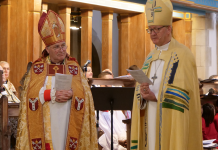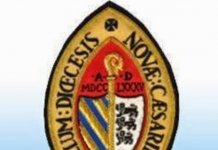The Rt. Rev. William Love, bishop of Albany, violated his ordination vows and The Episcopal Church’s canon law when he banned same-sex marriage in his diocese in 2018, a disciplinary hearing panel found in a decision issued late on Oct. 2.
The unanimous ruling, conducted under the church’s Title IV disciplinary process, refutes Love’s arguments – articulated by his counsel at a virtual hearing in June – that Love had not committed a canonical violation by prohibiting clergy from using the same-sex marriage rite approved for churchwide use by General Convention in 2018 because it was not a proposed revision to the Book of Common Prayer.
The decision does not stipulate what consequences Love will face. The panel will schedule another hearing for Love and the church to offer proposals and will then issue an order, which could involve suspending or deposing Love – essentially stripping him of his ecclesiastical authority. In a letter to his diocese, Love said that hearing “will be scheduled within the month.”
“While I am very disappointed and strongly disagree with the decision of the hearing panel … they have issued their judgement,” Love wrote. “Unfortunately, given the nature of this case, I have no reason to believe that appealing the hearing panel’s decision would result in any different outcome.
“Whatever the final outcome, it will severely impact not only me and the ministry entrusted to me as bishop of Albany, but it will also seriously impact the life and ministry of the diocese. I continue to pray that somehow God will use all of this for his purposes.”
Through the diocesan office, Love declined a request for additional comment.
The hearing panel is composed of Rhode Island Bishop Nicholas Knisely, president, Assistant Bishop Jennifer Brooke-Davidson of the Diocese of Virginia, the Rev. Erik Larsen of the Diocese of Rhode Island, Melissa Perrin of the Diocese of Chicago and retired Southern Virginia Bishop Herman Hollerith IV.
At the June hearing, the panel heard arguments from representatives of Love and The Episcopal Church, who did not dispute the facts of the case – or the theological validity of same-sex marriage – but debated whether Love’s actions had violated church canon law. The church, represented by lawyer Paul Cooney, argued that Love, by directing his clergy to continue complying with a diocesan canon prohibiting participation in same-sex marriages, had violated General Convention Resolution B012, which stipulates that “provision will be made for all couples desiring to use these [same-sex] marriage liturgies in their local congregation.”
The Rev. Chip Strickland, who represented Love and also serves as the Diocese of Albany’s chancellor, argued that Resolution B012 does not hold canonical status and, therefore, Love had not committed a canonical violation. Strickland asserted that authorized trial rites like the same-sex marriage liturgy in question only have canonical status if they are proposed revisions to the Book of Common Prayer, and that B012 does not fall under that category.
The hearing panel disagreed, saying the “plain language of the resolution” makes it a proposed revision to the Book of Common Prayer, even if it lacks “the magic words” explicitly identifying it as such. B012, the panel said, is canonical and therefore mandatory. By ignoring this mandate, Love violated church canons and his ordination vows.
The panel also refuted Love’s argument that B012 is inconsistent with the Book of Common Prayer, which still defines marriage as the union of a man and a woman in its catechism and marriage rubrics. The preface of the marriage rite in the Book of Common Prayer, the panel said, only applies to that particular rite and not the additional rites authorized by General Convention, and the rubrics to the catechism describe it as “an outline for instruction” that is “not meant to be a complete statement of belief and practice.”
Love’s 2018 pastoral directive banning same-sex marriages remains posted on the Diocese of Albany’s “Marriage/B012” webpage.
History of the case
In 2009, General Convention passed several resolutions seeking to make the church more welcoming to LGBTQ people, including by developing liturgies for blessing same-sex unions. Those liturgies were approved for use by General Convention in 2012.
Then, in June 2015, the U.S. Supreme Court ruled that same-sex civil marriage was legal in all 50 states. The 78th General Convention had just begun in Salt Lake City, Utah, and the bishops and deputies proceeded to approve the trial use of rites for same-sex marriage ceremonies that had been drafted by the Task Force on the Study of Marriage.
Love was one of eight diocesan bishops who, leading up to the 79th General Convention, still refused to allow use of the trial rites in their dioceses. Proponents of marriage equality sought a compromise that would ensure that same-sex couples had access to the rites in all domestic dioceses, even if bishops were opposed.
Bishop William Love of the Diocese of Albany tells General Convention on July 11, 2018, during the House of Bishops debate on Resolution B012 that passing the measure would force him to violate his ordination vows. Photo: Episcopal Church video
During its July 2018 meeting in Austin, Texas, General Convention passed Resolution B012, which essentially allowed those bishops to opt out of the process altogether, by asking an outside bishop, as necessary, to provide pastoral support when couples asked to use the trial rites. Though some supporters of same-sex marriage questioned whether a bishop’s involvement is even needed for individual weddings, the resolution passed with an overwhelming majority, including the backing of some of the former holdout bishops.
Facing a Dec. 2, 2018, deadline for implementing B012, the conservative bishops took a range of approaches. Virgin Islands Bishop Edward Ambrose Gumbs, for example, simply told clergy in his diocese to begin using the new marriage rites. Others, such as Dallas Bishop George Sumner and Springfield Bishop Daniel Martins, advised their congregations that bishops from neighboring dioceses would provide oversight if the rites were requested.
Love and Florida Bishop John Howard were the most vocal opponents of B012 during the General Convention debate, though Howard, too, ultimately offered clergy in his diocese a path toward offering the rites, with oversight from another bishop.
Only Love outright refused to honor B012. In a Nov. 10, 2018, letter to his diocese, Love said he would not allow same-sex couples to be married by priests in the Diocese of Albany.
The letter cited Bible verses from Leviticus to Romans to support Love’s belief that sexual intimacy between two men or two women was never God’s plan. He called homosexuality “sinful and forbidden” and cast the long-simmering Episcopal debate over same-sex marriage as a kind of existential crisis for the church, which he argued had been “hijacked” by a powerful, secular “Gay Rights Agenda.”
Love also said implementing B012 would require him to violate his vows of ordination, adding that others in his diocese are just as adamant in opposing same-sex marriage. The Diocese of Albany is based in New York’s capital city, though most of its 130 congregations are in less-populated communities between the Canadian border and the Catskill Mountains.
The reaction from top Episcopal leaders was swift. Presiding Bishop Michael Curry issued a statement two days after Love’s letter. In it, Curry affirmed the church’s commitment to full inclusion of LGBTQ members while respecting the conscience of those who disagree with the church’s policy on marriage.
At the same time, Curry said, all clergy are required to “act in ways that reflect and uphold the discernment and decisions of the General Convention of the church.”
The developments sent shock waves through the diocese, with supporters and opponents of Love’s decision both uncertain what would happen next. Curry followed up in January 2019 by temporarily restricting part of Love’s ministry as bishop because Love’s “conduct in this regard may constitute a canonical offense.”
Then in September 2019, while the House of Bishops was meeting in Minneapolis, Minnesota, church leaders informed Love he had been referred to the hearing panel for potential discipline under The Episcopal Church’s Title IV canon.
In an interview with Episcopal News Service during the House of Bishops’ September 2019 meeting, Love defended his actions and said he was thankful that he would have an opportunity to make his case before the panel.
“What I tried to do as best I can, by the grace of God, is to be faithful and obedient to that which I believe the Lord has called me to, even though it sometimes can be very difficult, and sometimes it’s not politically correct,” he said.










